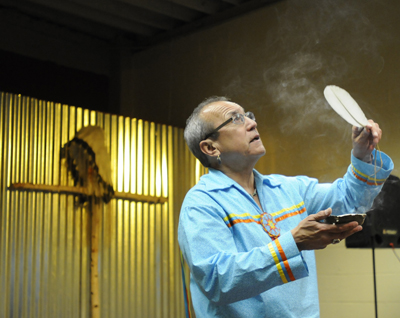
(RNS2-OCT28) The Rev. Mike Peters, pastor of 4 Fires Ministries in Michigan, uses an eagle feather as he smokes prayers to God. For use with RNS-INDIAN-CHURCHES, transmitted Oct. 28, 2010. Religion News Service photo by T.J. Hamilton /The Grand Rapids Press.
GRAND RAPIDS, Mich. (RNS) Smoke wafts upward as the Rev. Mike Peters blows on the Knick-Knick, a sacred herbal blend of spearmint leaves, red willow bark, sage, sweet grass and bayberry bush.
“As the smoke goes up, the Creator’s blessings go down,” Peters says. A dozen people sitting in a circle listen as he prays.
“I pray for the healing of hearts,” Peters says. “In the name of Jesus, we claim back our culture so we may glorify him again.”
To Peters and other local American Indians who yearn to discover or reclaim their cultural and religious heritage, the 4 Fires Ministries service, or circle, can offer a bridge between Christian and Native American spirituality.
The burning of Knick-Knick, a centuries-old ritual, is a case in point. The smoldering herbs are believed to absorb prayers sent to the Great Spirit, or in 4 Fires’ case, the Holy Spirit.
To the uninitiated who are accustomed to a Eurocentric model of worship, such rituals may be considered anathema to Christianity. Such a mindset is familiar to local First Nations people, many of whom were taught that blending their culture and Christianity is unchristian and pagan, even satanic.
As a result, some consider Christianity a white man’s religion, and practicing it means worshipping a white man’s God.
Less than 4 percent of American Indians in the U.S. are Christian, according to Peters. “There’s very few natives like myself,” said Peters. “Some of it is because too many in the church are asking me to stay out of my culture, think like them, worship like them.
“They’ll say how we do things is pagan and evil and yet, when I read my Bible, my culture is in the Bible.”
Some American Indians recall stories of nails run through their ancestors’ tongues to discourage speaking their native language, or the federal government once outlawing the beating of the drum and other religious practices.
Others, such as Phoebe Hall, 77, of Hopkins, Mich., recall classmates’ taunts.
They mimicked the stereotypical warlike whoop, compared her appearance with Quaker Oats Co.’s Aunt Jemima and alleged her traditional ways were rooted in witchcraft. Something in Hall was resurrected when she connected to the 4 Fires circle. “Until Mike’s teachings, I didn’t know about my identity as a Native American,” said Hall.
Peters understands. He, too, went on a quest 10 years ago after his father died. He started questioning if the spiritual ways of his ancestors were really all that incompatible with the Bible, or if there was a nexus between the two. What he discovered intrigued him.
Incense smoke, dance, the use of the drum, colorful garments — “even the way some natives think” — all match what the Bible condones as a viable way to honor and worship God.
“I started to see in God’s word so much of my native culture,” said Peters, 58, a member of the Odawa tribe and a third-generation minister. “I started to see that the spiritual ways of my ancestors reflect what’s in the Bible.”
Peters founded 4 Fires in 2006 in an attempt to bridge two worlds — the dominant Eurocentric culture and the wide assortment of American Indian beliefs.
An important element of 4 Fires is the Yashana Lodge that meets on Wednesdays in Grand Rapids. “Yashana” is Hebrew for “victory and freedom now.” There, Native American sacred ways are activated in the lives of those who follow Jesus, said Peters.
In June, Peters and other American Indians were invited to be part of a merger of the World Alliance of Reformed Churches and the Reformed Ecumenical Council into the World Communion of Reformed Churches, which represents 80 million Christians from 108 countries, in nearly 230 denominations worldwide.
“I think in a real sense, it was an acknowledgment on our part that history is spotted and painful, and we wanted to come to some kind of terms with that, so that may lead to some kind of atonement,” said Peter Borgdorff, immediate past president of the REC who now is a WCRC committee member.
“We are dealing with cultural genocide, and we wanted to find a meaningful way to that history and to the people that relate to that history,” said Borgdorff. “We are talking about various options (with Peters and others), but it’s too early to know what form that future relationship may take.”
Peters, an ordained minister with Resurrection Life Church, an independent congregation in Grandville, dubbed his ministry 4 Fires to reflect the three nations that historically characterize Michigan: Odawa, Ojibwa and Potawatomi. The fourth “fire” is the Holy Spirit.
While he honors the traditional ways, Peters draws a line in what the rituals mean to followers of “Gitchi Manitou,” the Algonquin name for Creator.
“There’s no power in the ceremony,” he said. “Like Communion, with the crackers and the grape juice, it represents a spiritual application. It’s my faith that’s speaking that prayer into fruition.”
Luther Vonmiller said his service in the Marine Corps and Army brought him around the world, but he never crossed paths with his Blackfoot heritage. That changed when he found 4 Fires.
“It’s taken the edge off of my loneliness because I can reconnect here with others under the banner of Jesus Christ,” Vonmiller said. “This goes far beyond Indian nostalgia. The cross of Christ is over it all.”
(Paul R. Kopenkoskey writes for The Grand Rapids Press in Grand Rapids, Mich.)




